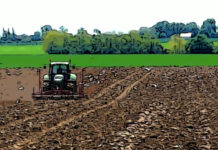On 6/22/22, the European Commission finally presented a proposal for an EU regulation to reform the so-called Pesticides Regulation with a view to substantially reducing the use of pesticides, herbicides, fungicides and other agrochemicals that are hazardous to human health, animal health and the environment. (1)
The proposal appears to be in line with commitments made in Brussels in the EU Farm to Fork strategy-and at least in part-with subsequent demands, from the European Parliament and civil society.
An ecological transition in agriculture and the management of green and natural areas is promised. Albeit in milder terms than those proposed in the European Citizens’ Initiative #Savethebees and the farmers. (2) With a focus on so-called ‘sensitive areas’ and microbiological pesticides as the innovation of least socio-environmental impact.
Pesticide reduction, the key principles
The new regulation, in the Brussels proposal, differs from its predecessor (EC Reg. 1107/09) by affirming certain key principles:
– legally binding targets to reduce, by 2030, both the uses and risks of chemical pesticides (-50 percent) and the use of the most hazardous active substances. Member states will be responsible for setting reduction targets within EU-defined parameters and national strategies to ensure that the common target is met,
– Ecological control of pests. Integrated Pest Management will force farmers to consider all alternative methods of pest control before chemical pesticides can be used only as a last resort,
– Ban on the use of all pesticides in so-called ‘sensitive areas’. The use of all agrotoxics is prohibited at distances less than 3 meters from public parks or gardens, playgrounds, recreational or sports areas, public trails, and ecologically sensitive areas. A distance moreover established in defiance of the scientific literature that instead shows that the so-called drift effect has quite a different extent. (3)
Support for farmers
The European Commission is also promising ‘exceptional’ economic support to enable farmers and ranchers-the key players in the ecological transition-to cope with a radical change in their agronomic and operational practices. Therefore, the Common Agricultural Policy (CAP) should dedicate special resources to cover the costs required to fulfill the new requirements for farmers.
The real challenge will be convincing member state governments-now perhaps the most responsive to the lobbies of the Big 4, the monopolists of pesticides and agrotoxic tanned seeds-to actually follow up on these measures in national strategic plans. As it already should have happened and did not (4,5).
Innovation and microbiological pesticides
Innovation is mentioned as one way to promote the reduction of pesticide and other agrochemical use. It includes research and development on so-called microbiological pesticides, which could accompany and facilitate the conversion of crops to the organic system.
In fact, microorganisms–e.g., bacteria, fungi, viruses, protozoa–are already used to protect plants, as some of them are parasites or pathogens to insects and other organisms that are themselves parasites or pathogens to plants. Therefore, on 8.2.22 the Council approved four implementing regulations that simplify their licensing procedures. (6)
Dario Dongo
Cover image developed on a beautiful vignette by Chappatte (Les Temps, 2021)
Notes
(1) European Commission. Farm to Fork: New rules to reduce the risk and use of pesticides in the EU. Press release. 22.6.22, https://ec.europa.eu/commission/presscorner/detail/en/qanda_22_3694
(2) Dario Dongo. #SaveTheBees, civil society calls for a true pesticide-free ecological transition in the EU. GIFT(Great Italian Food Trade). 17.6.22,
(3) Dario Dongo.
The drift effect of pesticides on bees, trees and plants away from cultivated land.
. GIFT (Great Italian Food Trade). 21.12.20,
(4) Dario Dongo. CAP, European Commission rejects Italy’s National Strategic Plan. #CleanSpades. GIFT (Great Italian Food Trade), 14.4.22,
(5) Dario Dongo. Common Agricultural Policy, what controls on member states’ management? Question. GIFT (Great Italian Food Trade). 26.4.22,
(6) European Commission. Micro-organisms used in plant protection products. https://ec.europa.eu/food/plants/pesticides/micro-organisms_en
Dario Dongo, lawyer and journalist, PhD in international food law, founder of WIISE (FARE - GIFT - Food Times) and Égalité.








